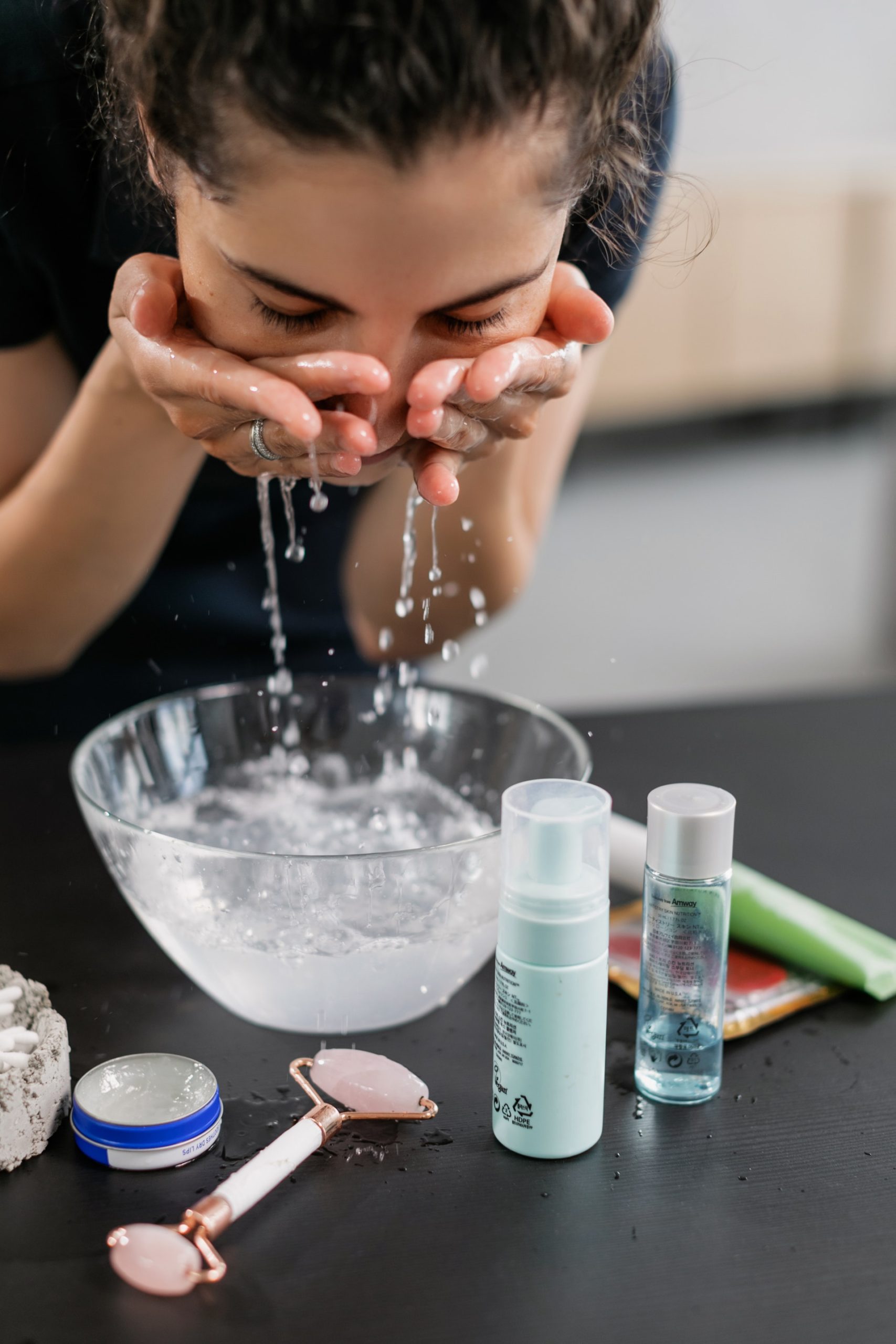Our Tried-and-True Night Skincare Routine for Acne Prone Skin
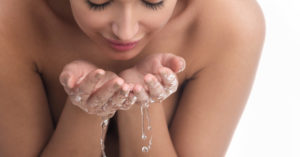
Acne-prone skin can be a real challenge to manage, especially when it comes to skincare and coming up with an acne treatment regimen to address all of your skin concerns and achieve healthy skin. For an acne skincare routine, you want to make sure you’re using the right products that won’t cause more breakouts, blackheads, whiteheads, acne-like cysts, dry skin or irritation. That’s why having a nighttime skincare routine to support acne specifically is crucial. In this blog post, we will discuss the importance of this nighttime skincare routine and walk you through step by step on how to create your own. We’ll also dive into the best products for each step, including face wash, cleansers, exfoliants, treatments, moisturizers, and serums/oils. Lastly, we’ll give you some tips on how to troubleshoot any issues you may encounter while following this routine so that you can achieve clearer, healthier-looking skin. So let’s get started on achieving your best skin yet!
Importance of a Night Skincare Routine for Acne Prone Skin: For Clear Pores, Less Pimples, Fewer Blackheads and Whiteheads!
For people with acne-prone skin, maintaining a consistent nighttime skincare routine can make a huge difference. A good routine should include cleansing and exfoliating to remove excess oil, dirt, and impurities that can clog pores and lead to breakouts. Targeted treatments like salicylic acid or benzoyl peroxide can also be incorporated to help treat existing acne.
It’s essential not to skip moisturizing because dehydration can worsen breakouts. As part of the routine, the skin needs nourishment, so incorporating a moisturizer with nourishing ingredients is essential. It’s also crucial to apply sunscreen during the day to prevent further damage and breakouts. Remember, a healthy skincare routine is one that is consistent, customizable, and incorporates time-tested products for your specific skin type.
Disclaimer: hearwegogo.com has partnered up with collectivevoice and amazon. This blog may receive commissions for the affiliate purchases that are made through my sites links. All of the products discussed throughout this article are tagged for your convenience, and will lead you directly to a purchase link.
Understanding Your Skin Type
Before setting up a skincare routine, it’s essential to understand your skin type. Acne-prone skin requires special attention, and using the right products can make all the difference. A gentle cleanser is a must for tackling acne-prone skin. Non-comedogenic products that do not clog pores are also key in preventing breakouts.
A nighttime skincare routine should include cleansing, toning, treating acne with targeted treatments, and moisturizing. Based on individual needs and preferences, exfoliation, masks or other treatments could be added to the routine. It is essential to choose skincare products wisely by looking for ones formulated specifically for oily or acne-prone skin types. The goal of this comprehensive skincare routine is to achieve healthy-looking skin every day.
Cleansing Your Face As A Part Of Your Night Skincare Routine for Acne Prone Skin
The first and foremost step in any effective nighttime skincare routine is cleansing. For acne-prone skin, it’s important to use a gentle, non-comedogenic cleanser that can remove dirt and oil from your face without stripping the skin of its natural oils. Double cleansing can ensure that all traces of makeup and impurities are removed before moving on to other steps.
It’s important not to over-cleanse or use harsh scrubs that can irritate the skin. Consider using a cleansing brush or tool to help exfoliate and deep clean pores, but be sure to use it gently and not too frequently. Your skin should feel clean, refreshed, and balanced after cleansing – ready for the next steps of your skincare routine.
Double Cleansing Method

Cleansing your face is an important step in any skincare routine, especially for those with acne-prone skin. One effective method for thoroughly removing dirt, makeup, and impurities from the skin is the double cleansing method. This involves using an oil-based cleanser to dissolve excess sebum and unclog pores, followed by a water-based cleanser to remove any remaining residue.
When choosing a cleanser, it’s important to opt for gentle, non-comedogenic options that won’t irritate or further inflame acne-prone skin. Consistency is key when it comes to skincare routines, so stick with a routine that works for you and be patient with the results. By incorporating the double cleansing method into your nighttime skincare routine, you can help keep your skin clear and healthy.
Disclaimer: hearwegogo.com has partnered up with collectivevoice and amazon. This blog may receive commissions for the affiliate purchases that are made through my sites links. All of the products discussed throughout this article are tagged for your convenience, and will lead you directly to a purchase link.
Using a Gentle Cleanser
When it comes to cleansing your face as part of your nighttime skincare routine for acne-prone skin, using a gentle cleanser is key. Look for cleansers that are free of harsh chemicals and fragrances to prevent irritation and dryness. It’s important to cleanse your face twice a day – once in the morning and once at night – to remove dirt, oil, and makeup.
Avoid scrubbing your face too hard, as this can exacerbate acne and cause more breakouts. Instead, use gentle circular motions with your fingertips to cleanse the skin. After cleansing, be sure to follow up with a moisturizer to keep your skin hydrated. This will help prevent further breakouts and ensure that your skin stays healthy and nourished.
1.CeraVe Smoothing Cleanser

When it comes to caring for acne-prone skin, cleansing is an essential step in any skincare routine. The CeraVe Smoothing Cleanser is a great option for those looking for a gentle yet effective cleanser. It contains salicylic acid, which helps unclog pores and smooth out rough skin texture. Additionally, it’s non-comedogenic, meaning it won’t clog your pores or contribute to breakouts.
It’s important to cleanse your face daily, especially before bed, to remove dirt, oil, and makeup that can lead to acne. Using a gentle cleanser like CeraVe can help remove these impurities without stripping the skin of its natural oils. By incorporating this simple step into your nighttime skincare routine, you can take proactive steps towards maintaining healthy and clear skin.
Another great option for a cleanser for acne-prone skin would be La Roche-Posay Effaclar Daily Foaming Cream Face Cleanser For Oily to Combination Skin with Salicylic Acid and Glycerin. Sebum and pore minimizer. Paraben-Free, Oil-Free, Alcohol-Free, Non Comedogenic. Micellar cleansing water traps the makeup and impurities in the micelles’ oil, leaving your skin perfectly cleansed, hydrated, and refreshed. Purifying Zinc then removes the excess oil and leaves your skin feeling fresh.Micellar water removes dirt, oil, makeup, and even pollutants that can be 20 times smaller than a human pore.
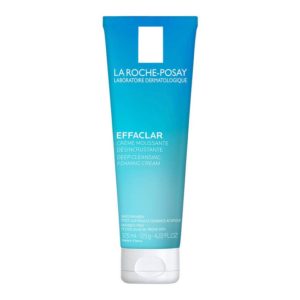
2.Toner As A Part of Your Night Skincare Routine For Acne Prone Skin
La Roche-Posay Face Toner, Effaclar Astringent for Oily Acne Prone Skin with Exfoliating Salicylic Acid and LHA is a great toner developed for acne-prone skin. It helps to visibly reduce the look of enlarged pores.
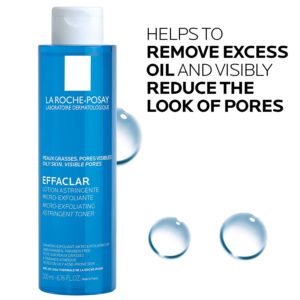
Effaclar Astringent Lotion is a daily facial toner suitable for oily skin. Formulated with micro-exfoliating (LHA), this toner smoothes and refines the skin’s texture and unblocks and tightens pores. It makes enlarged pores appear reduced. This light, micro-exfoliating astringent lotion spreads easily on the face, leaving skin feeling refreshed. It is perfect to use as part of your skincare routine. To be used after cleansing the skin.
3. Exfoliate

Exfoliating is a crucial step in any skincare routine, especially for those with acne-prone skin. It helps to remove dead skin cells and unclog pores, which can prevent breakouts in the long run. After cleansing and treating your skin with spot treatments or serums, use an exfoliating product. However, it’s essential to find a gentle exfoliator that won’t cause irritation or further damage to the skin. Once you’ve exfoliated, finish off your routine by applying a moisturizer to keep your skin hydrated and prevent dryness. Don’t forget sun protection even at night: using a moisturizer with SPF can shield your skin from harmful UV rays during the day.
The Best Exfoliating Treatments For Your Night Skincare Routine For Acne Prone Skin
Chemical exfoliants like AHAs and BHAs are gentle on the skin and help to unclog pores and reduce breakouts. These types of exfoliants work by breaking down dead skin cells on the surface of the skin, revealing fresher, smoother skin underneath. In contrast, physical exfoliants like scrubs can be too harsh on the skin and cause irritation. When choosing an exfoliant for acne-prone skin, it’s important to look for one that is specifically formulated to avoid further aggravating your condition. Regular use of a suitable exfoliating treatment can improve your skin’s texture and appearance, making it smoother and more radiant.
Paula’s Choice Skin Perfecting 2% BHA Liquid Salicylic Acid Exfoliant

This gentle non-abrasive, leave on exfoliant with 2% BHA (Beta hydroxy acid) is used to unclog & diminish enlarged pores, exfoliate dead skin cells, smooth wrinkles, and brighten and even out skin tone. It combats redness, wrinkles, aging, enlarged pores, and blackheads. It dramatically improves skin’s texture for radiant youthful even-toned skin. Beta hydroxy acid (BHA also known as salicylic acid) mimics the natural exfoliation process of younger skin by helping it shed extra layers while unclogging and clearing pores. It works to HYDRATE, BRIGHTEN & SMOOTH FINE LINES: Our unique, non-abrasive, leave-on exfoliant is gentle enough for daily use on all skin types. It exfoliates dead skin cells while clearing pores for a more even tone, plus it visibly reduces fine lines & wrinkles. Paula’s Choice facial exfoliants are gentler on delicate skin of the face & neck than an abrasive face scrub, which can cause micro-tears. A BHA leave-on exfoliator delivers hydration & can exfoliate directly inside the pore & improve how the pore works.
Carbon Theory Breakout Control Cleansing Pads
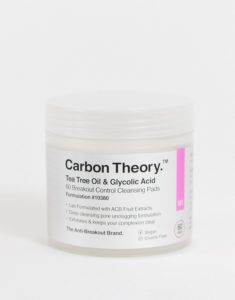
Exfoliating is an essential step in any skincare routine for acne-prone skin as it helps to remove dead skin cells and unclog pores. One effective way to exfoliate and treat acne at the same time is by using Carbon Theory Breakout Control Cleansing Pads.
Infused with charcoal and tea tree oil, these pads are known for their purifying properties. They also contain salicylic acid, which helps to clear up existing breakouts and prevent new ones from forming. Regular use of these pads can improve the overall appearance and texture of your skin. Carbon Theory Breakout Control Cleansing Pads are a convenient and effective solution for anyone looking to maintain healthy, clear skin.
Freck Cactus Water Lactic Acid Toner
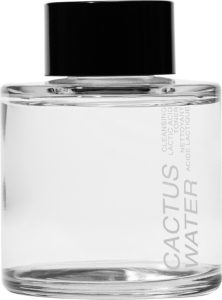
Exfoliating regularly is an important step in any nighttime skincare routine, especially for those with acne-prone skin. By removing dead skin cells and unclogging pores, exfoliation can help reduce the risk of acne breakouts. One great option for gentle exfoliation is the Freck Cactus Water Lactic Acid Toner.
This toner contains cactus water, lactic acid, and a blend of fruit extracts that work together to gently exfoliate and soothe the skin. It’s suitable for all skin types, including acne-prone skin, and can be used daily. The combination of hydrating cactus water and exfoliating lactic acid makes this toner a valuable addition to any nighttime skincare routine for those looking to improve their skin’s texture and tone.
4. Treating Your Blemishes As A Part Of Your Night Skincare Routine For Acne Prone Skin
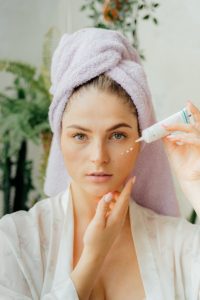
Acne-prone skin can be tough to manage but following a consistent skincare routine can help. After cleansing with a gentle cleanser, it’s time to treat those stubborn blemishes. Look for products containing acne-fighting ingredients such as benzoyl peroxide or salicylic acid. These ingredients work by unclogging pores and reducing inflammation. A spot treatment can be used for particularly stubborn blemishes.
If your acne is severe, you may want to consider prescription-strength medication like retinoids. However, these should only be used under the guidance of a dermatologist as they can have side effects if not used correctly. Remember, consistency is key when treating acne-prone skin so stick to your routine and don’t give up!
The best overnight serums for acne-prone skin
One effective way to treat acne-prone skin is by using overnight serums that help reduce inflammation and promote healing. When choosing a serum, look for ingredients like salicylic acid or retinol, which can unclog pores and reduce the appearance of acne. However, it’s important to patch test any new products before incorporating them into your skincare routine to avoid potential irritation or allergic reactions.
There are several great options for overnight serums that are specifically formulated for acne-prone skin. Some of the best include those containing salicylic acid or benzoyl peroxide. These ingredients work by reducing inflammation and killing bacteria on the skin’s surface. Consistency is key when using these products, so it’s important to stick with your nighttime skincare routine for optimal results. With patience and dedication, you can achieve clearer, healthier-looking skin.
Skin Proud Recharge Overnight 0.5% Retinol Serum
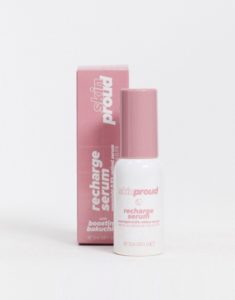
One of the key steps in my nighttime skincare routine for acne-prone skin is treating with Skin Proud Recharge Overnight 0.5% Retinol Serum. Retinol is a powerful ingredient that can help reduce the appearance of acne scars and fine lines, and this serum contains a high concentration of retinol to boost collagen production and improve skin texture.
To use retinol effectively, it’s important to apply it at night to avoid sun sensitivity. However, it’s also important to start with a low concentration and gradually increase over time, as retinol may cause some initial irritation or dryness.
After applying the serum, always follow up with a moisturizer to keep your skin hydrated. With consistent use, Skin Proud Recharge Overnight 0.5% Retinol Serum can be an effective addition to your skincare routine for improving the overall health and appearance of your skin.
Eva Naturals Vitamin C Serum Plus With Hyaluronic Acid Serum, Retinol, Niacinamide, Salicylic Acid Vitamin C Serum for Face
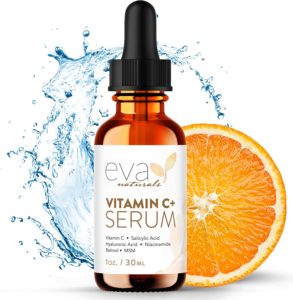
Loaded with antioxidants, our Vitamin C Serum for face with hyaluronic acid helps reduce fine lines and wrinkles! Hyaluronic Acid provides incredible hydration by holding up to 1000 times its weight in water! You will have a glowing complexion. For acne and other skin conditions that leave your complexion looking red and uneven. The Niacinamide and Retinol serum found in our formula supports healthy skin by naturally reducing inflammation, correcting dark spots, and soothing troubled skin. This acts as the best acne treatment. When pores are clogged with dirt and oil, they become larger and more visible. Retinol works to cleanse the pores, thereby making them appear smaller. Add to that the exfoliating effects of Salicylic Acid, and our face serum is ready to fight blemishes and improve acne prone skin.
Prescription Medications for Severe Acne Breakouts
For those with severe acne that doesn’t respond to over-the-counter treatments, prescription medications may be an option. Common prescription medications for acne include retinoids, antibiotics, and oral contraceptives (for women). Retinoids work by unclogging pores and reducing inflammation, while antibiotics can help reduce the bacteria on the skin and decrease inflammation. Oral contraceptives can regulate hormones that contribute to acne.
It’s important to consult with a dermatologist before starting any prescription acne medication, as they can recommend the best treatment plan for your specific skin type and severity of acne. While prescription medications can be effective in treating severe acne, they may also have side effects or require ongoing monitoring. As always, maintaining a consistent skincare routine and practicing good hygiene habits can also help prevent and manage acne.
Hydrate Your Skin As A Part of Your Night Skincare Routine for Acne Prone Skin
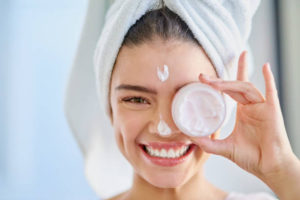
Incorporating hydration into your nighttime skincare routine can help improve the overall appearance of acne-prone skin. Using a gentle cleanser to remove makeup and impurities without stripping the skin’s natural oils is crucial. Adding a non-comedogenic, oil-free moisturizer to your routine will help keep your skin hydrated without clogging pores or causing breakouts.
Consider using a hydrating serum with ingredients like hyaluronic acid that can plump up the skin and reduce the appearance of fine lines. Additionally, incorporating facial oils into your routine can nourish the skin and improve its texture. By taking these simple steps, you can effectively hydrate your acne-prone skin at night and wake up with a rejuvenated and refreshed complexion.
Some great moisturizers for Night Skincare Routines for Acne Prone Skin Are:
CeraVe NIGHT Cream for Face, Skin Renewing Moisturizer for Men & Women This cream comes with Hyaluronic Acid, Niacinamide, Bio Peptides & Ceramides. It is fragrance free, non-comedogenic, and for sensitive skin .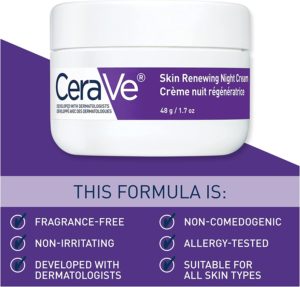
Burt’s Bees Sensitive Hydrating Night Face Cream, This Face Moisturizer for Sensitive Skin comes with Aloe and Rice Milk. It is 98.9% Natural Origin and developed with dermatologists.
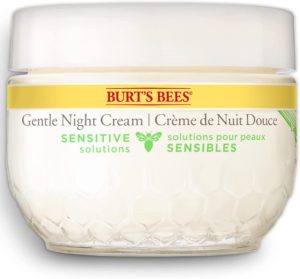
Eucerin Sensitive Skin Redness Relief Soothing Night Creme This cream is a Hydrating formula with licochalcone, a skin-soothing extract of the licorice root. It’s Unique gel-creme moisturizer calms and soothes dry, uncomfortable skin. It is fragrance-free, oil-free, and non-comedogenic.
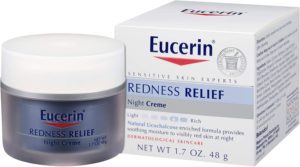
Benefits of Using a Moisturizer, and sunscreen lotion with acne-fighting agents
Hydrating your skin is an essential step in any effective skincare routine, especially for those with acne-prone skin. Using a moisturizer can help to prevent dryness and irritation that could exacerbate acne. It’s important to choose the right moisturizer for your skin type, opting for non-comedogenic formulas that won’t clog pores.
In addition to preventing dryness and irritation, incorporating a moisturizer with ingredients like hyaluronic acid or ceramides can help to lock in moisture and improve the overall health of your skin. This is particularly important for those with acne-prone skin, as dehydration can worsen breakouts.
Finally, it’s important to apply your moisturizer at night before bed to allow it time to fully absorb into your skin. This will give you maximum benefits from the product, leaving you with softer, smoother, and more hydrated skin come morning.
Vanicream Daily Facial Moisturizer With Hyaluronic Acid 5 Key Ceramides and Squalane For Sensitive Skin Fragrance and Gluten Free pH-Balanced Dermatologist Tested. A breakthrough in sensitive skincare! Vanicream’s Daily Facial Moisturizer is designed to dramatically improve skin texture and keep sensitive skin moisturized. This allergy safe moisturizer is luxurious and lightweight, and wears well under makeup. Containing hyaluronic acid and 5 key ceramides (all natural compounds found in healthy skin), this moisturizer is targeted at improving the appearance of facial skin, reducing fine lines by blocking moisture loss. As with all of our moisturizers, this product is free of dyes, lanolin, fragrance, masking fragrance, protein, parabens and formaldehydes!
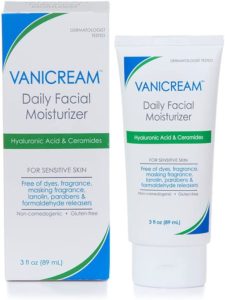
As for Moisturizer for AcneProne Skin, Cetaphil PRO DermaControl Oil Control Moisturizer SPF 30 With Zinc Complex, For Oily and Sensitive Skin – Broad Spectrum Protection With Matte Finish – Dermatologist Recommended would definitely be a great option.
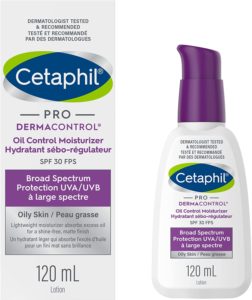
Choosing the Right Moisturizer for Your Night Skincare Routine For Acne Prone Skin
When it comes to acne-prone skin, choosing the right moisturizer is crucial in preventing further breakouts. Look for a lightweight and oil-free moisturizer that won’t clog pores. Ingredients like hyaluronic acid and glycerin can hydrate the skin without causing acne.
Avoid moisturizers with fragrances or essential oils as they can irritate the skin and worsen acne. Even if you have oily skin, don’t skip moisturizing as dehydration can trigger more oil production and lead to breakouts. A good moisturizer helps to balance your skin’s oil production and keep it hydrated, leaving your skin feeling soft and smooth.
Protecting with Night Cream/Sleeping Mask in your Night Skincare Routine For Acne Prone Skin
Incorporating a night cream or sleeping mask into your skincare routine can help protect your skin while you sleep. Look for ingredients that are beneficial for acne-prone skin, such as salicylic acid or tea tree oil. These ingredients can help hydrate and nourish the skin, reducing the appearance of acne scars and hyperpigmentation.
To ensure effective results, it’s important to cleanse and tone your skin before applying the night cream or sleeping mask. This helps remove dirt and oil buildup from the day that may clog pores and cause breakouts.
When looking for a night cream, it’s important to choose one with ingredients such as hyaluronic acid, retinol, and vitamin C for maximum benefits. These ingredients work together to improve the texture and tone of your skin, while also fighting against acne-causing bacteria.
Some great Sleeping Moisture Masks are:
LANEIGE Lip Sleeping Mask: Nourish & Hydrate with Vitamin C, and Antioxidants.
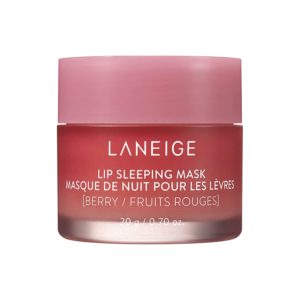
LANEIGE Water Sleeping Mask Overnight Gel, Replenishes Skin to Brighten, Clarify, Hydrate and Strengthen Skin’s Moisture Barrier with Sleep-biome technology and Squalane.
PYUNKANG YUL Sleeping Mask with willow bark, astragalus root, ceramide, hyaluronic acid for deep nourishing, hydrating, refreshing skin, Korean skin care moisturizing night cream, safe on sensitive skin, Soft Cream Formula.
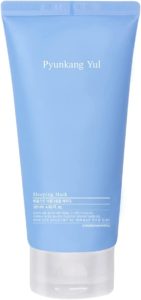
Nourishing with Serums/Oils in Your Night Skincare Routine For Acne Prone Skin
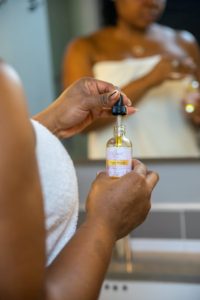
When it comes to nourishing your acne-prone skin, serums and oils can be your best bet. Choose a serum or oil that is suitable for your skin type and concerns. Look for ingredients like Vitamin C, retinol, and hyaluronic acid to target specific concerns such as acne, fine lines, and hydration.
After cleansing and toning, apply the serum or oil onto your face. Gently massage the product into your skin to enhance absorption and effectiveness. Ensure that you keep up with using the serum or oil consistently for better results over time. Remember to follow up with moisturizer after applying the serum or oil to give your skin a final boost of hydration.
CeraVe RETINOL Cream Serum for Face with niacinamide, hyaluronic acid & ceramides. for fine lines, radiance & wrinkles. Non-irritating, fragrance-free, and non-comedogenic.
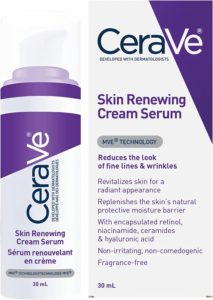
All Natural Advice Vitamin C Serum For Face with hyaluronic acid & Vitamin E. Facial serum. Organic face care made from a proud Canadian company.
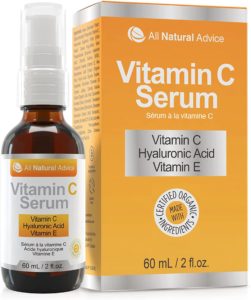
Hyaluronic Acid Serum for Face a hyaluronic acid facial Serum for women to remove fine lines, wrinkles, and boost collagen. Anti Aging Serum by grace and stella. One of my personal favourites.
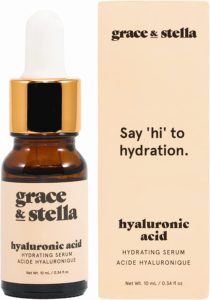
Treating Hyperpigmentation and Scarring with Serums in your Night Skincare Routine For Acne Prone Skin
Serums and oils can be an important part of a nighttime skincare routine for those with acne-prone skin. These products provide deep nourishment to the skin, helping to reduce acne and prevent future breakouts. For those dealing with hyperpigmentation and scarring, serums containing ingredients like vitamin C and niacinamide can be particularly effective.
It’s important to choose serums that are appropriate for your specific skin type and concerns. Applying a facial oil after serum can also provide additional hydration and lock in the benefits of the serum. When using these products, consistency is key. By sticking with a regular skincare routine that incorporates nourishing serums and oils, you can achieve healthier, more radiant-looking skin over time.
EnaSkin Dark Spot Remover For Face, Vitamin C Serum for Face, Hydrating Vitamin C Serum For Your Face Achieve Timeless Skin, For Acne Face Serum For Women and Men.
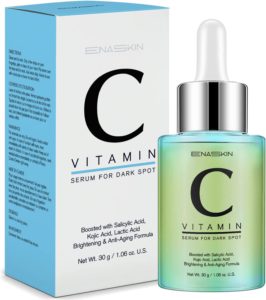
Bio-Oil Skincare Oil Specialist Skincare Formulation. Doctor Recommended. IMPROVES APPEARANCE OF ACNE SCARS AND STRETCH MARKS – Clinically proven to help repair skin damage and scars from pregnancy, surgery, injury, acne, C-section, aging, and more. Bio-Oil is non comedogenic and a great acne scar treatment for face. Vitamin A Oil promotes the formation of new collagen and assists in skin renewal, increasing skin elasticity. Vitamin E Oil, Chamomile Oil, Sunflower Oil, and Lavender Oil are anti-inflammatory and promote healthy skin
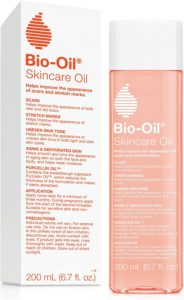
Moisturizing and Soothing Your Skin with Facial Oils for Night Skincare Routine for Acne Prone Skin
Facial oils and serums can be a great addition to your nighttime skincare routine, especially if you have acne-prone skin. Oils like jojoba, tea tree, and rosehip are known for their nourishing properties and can help to moisturize and soothe the skin. Serums can provide additional benefits such as brightening or reducing fine lines.
When choosing these products, it’s important to look for ones that are non-comedogenic and won’t clog your pores. Applying these products at night allows your skin to rejuvenate while you sleep, helping to improve its overall health and appearance. Adding nourishing oils and serums to your nighttime skincare routine can be an effective way to nourish your skin and keep it looking its best.
Palmer’s Cocoa Butter Formula Moisturizing Skin Therapy Oil for Face with Vitamin E, C & 10 Pure Facial Oil Blend, Rosehip Fragrance.
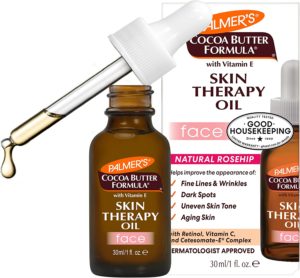
Final Thoughts and Tips for a Successful Night Skincare Routine for Acne Prone Skin.
To have clear skin, it is important to stick to a consistent skincare routine and be patient with the results. For acne-prone skin, using gentle, non-comedogenic products that do not clog pores is essential. Incorporating acne-fighting ingredients such as benzoyl peroxide or salicylic acid can also help combat breakouts. Moisturizing is critical to maintain skin hydration and balance.
However, there are certain things that you should avoid while having an acne-prone skin. Picking or popping pimples may lead to scarring and further breakouts. It is important to note that each person’s skin is unique, so finding a skincare routine that works for you might take some trial and error. Keep in mind these tips and tricks to achieve acne-free skin!
Frequently Asked Questions
What are some common mistakes people make in their time skincare routine for Acne Prone skin?
Some common mistakes people make in their nighttime skincare routine for acne-prone skin include using harsh, drying products that strip the skin of its natural oils, not properly removing all makeup and dirt before applying skincare products, over-exfoliating which can cause irritation and inflammation, and using too many products at once which can overwhelm the skin and worsen acne.
To avoid these mistakes, opt for gentle, non-drying cleansers and moisturizers specifically designed for acne-prone skin. Limit exfoliation to once or twice a week and consider simplifying your routine to fewer products to reduce the risk of irritation.
What products should I avoid using on my Acne Prone skin during my night skincare routine?
If you have acne-prone skin, it’s important to be mindful of the products you use in your nighttime skincare routine. You should avoid using products with harsh chemicals, as well as heavy oils or thick creams that can clog pores and worsen acne.
Fragranced products should also be avoided, as they can irritate sensitive skin. Instead, opt for gentle, non-comedogenic products specifically designed for acne-prone skin to help keep breakouts at bay.
What should be a basic night skincare routine for acne prone skin?
A basic night skin care routine should involve three steps: cleanse, tone, and moisturize.
First, start by cleansing your face to remove any makeup, dirt, or oil buildup from the day. Use a gentle cleanser that is appropriate for your skin type and massage it into your skin using circular motions. Rinse thoroughly with lukewarm water and pat dry with a clean towel.
Next, apply a toner to your skin using a cotton ball or pad. Toners help to balance the pH of your skin and remove any remaining impurities. Choose a toner that is appropriate for your skin type and avoid products that contain alcohol or other harsh ingredients that can irritate your skin.
Finally, apply a moisturizer to your face and neck to hydrate and protect your skin while you sleep. Look for a moisturizer that is appropriate for your skin type and contains ingredients like hyaluronic acid or ceramides to help lock in moisture.
With these three simple steps, you can help keep your skin looking healthy and radiant. Remember to choose products that are appropriate for your skin type and avoid harsh chemicals or ingredients that can cause irritation or damage over time.
Conclusion
In conclusion, it’s important to remember that creating a consistent nighttime skincare routine is crucial for acne-prone skin. Finding the right products that work for your skin type and addressing specific concerns such as treating acne, hydrating your skin, and nourishing with serums/oils are all essential steps in achieving clear and healthy-looking skin. Don’t forget to incorporate over-the-counter or prescription medications if necessary and protect your skin with night creams or sleeping masks. With these tips and tricks, you’re well on your way to a successful nighttime skincare routine that will leave you feeling confident in your own skin. Want more skincare tips? Check out our blog on the best ingredients for acne-prone skin.

